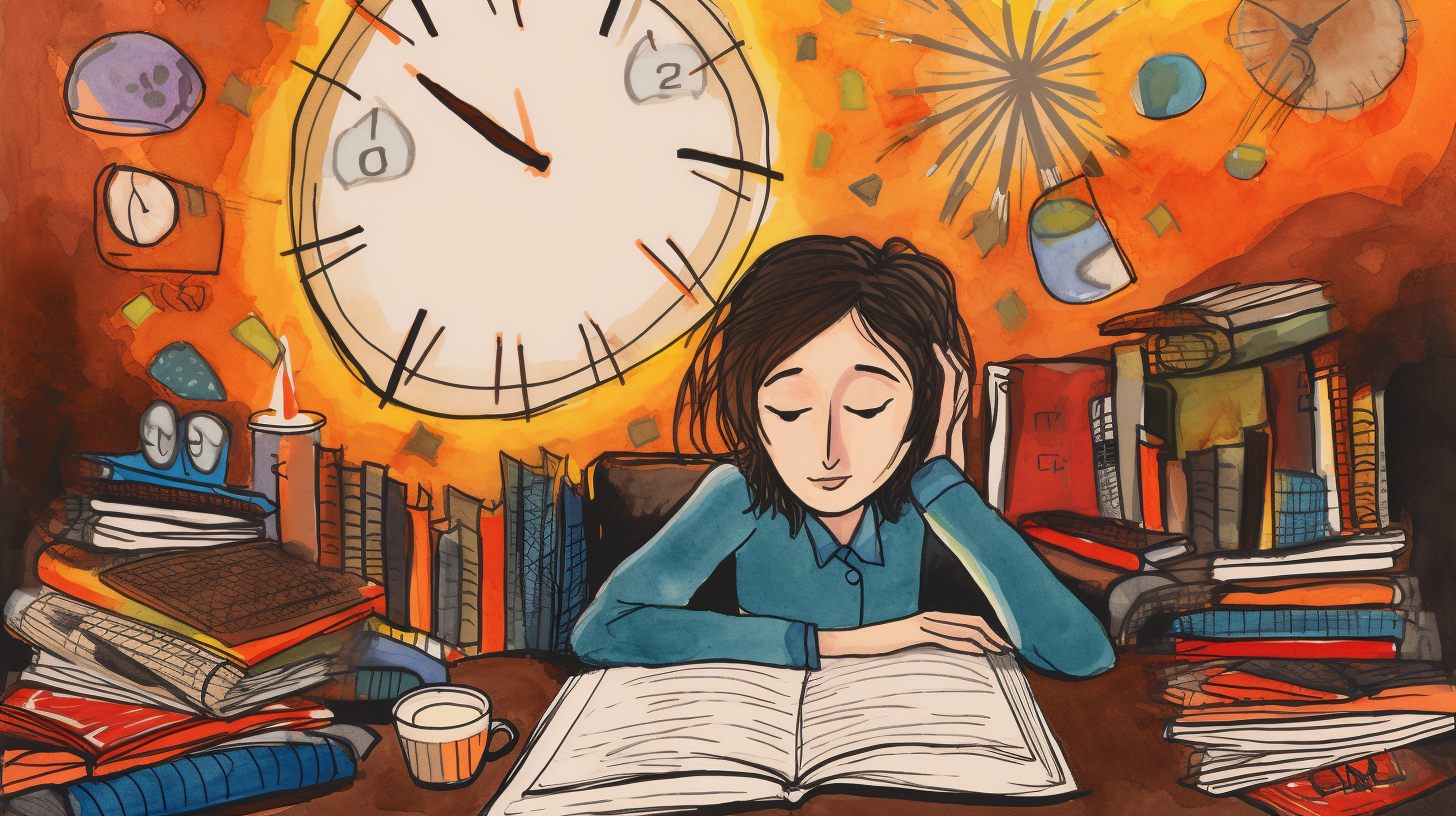Have you ever thought about when is the best time to read? Timing can be everything, whether you’re a voracious reader or just getting started. In this text, you’ll discover why timing matters, how different times of the day can impact your reading experience, and what factors you should consider to pinpoint your ideal reading slot.
We’ll explore the benefits of morning reading when your mind is fresh, afternoon reading for a midday break, and evening reading to unwind. By understanding the effect of various times on reading, you’ll be better equipped to make the most out of your pages. So, let’s jump into the world of books and time to unlock your best reading moments.
Why is Timing Important for Reading?
When you’re juggling a busy schedule, it’s crucial to identify the best time to read to maximize your comprehension and retention. The time of day can significantly impact your reading effectiveness, and finding the right window can enrich your experience with a book.
Reading in the morning offers an array of benefits. Studies suggest that for many people, morning is when the brain is most alert and receptive. This makes the early hours ideal for absorbing complex information and contemplating new ideas. If you’re wondering when to read, consider this: morning reads could mean you digest and retain concepts more efficiently than at other times.
The best time of day to read, but it isn’t set in stone. While mornings are great for clarity and focus, it’s essential to note that individual circadian rhythms play a part. If you’re inherently a night owl, you may find your concentration peaks in the evening. In this case, when should I read leans towards night-time being your ideal reading time.
As you consider when to read books, audiobooks can be an indispensable ally in your reading habits. They allow for flexibility, making the best time to read a book a more fluid concept. You might unlock new pockets of time where reading would otherwise be impossible, like during a commute, a workout session, or even while doing household chores. Audiobooks expand on the traditional time to read a book, fitting seamlessly into various parts of your day.
Whether it’s reading in the morning vs night, the key takeaway is that you’ve got to align your reading time with the period you’re at your mental best. If you continually ask whether reading at night or in the morning is better? Experiment with different times. Assess when your mind feels sharpest, and make that your go-to. Remember, the objective is to enjoy and fully comprehend what you’re reading, whether it’s an engaging novel or educational material. Allocate your reading time strategically, and you’ll enjoy the process more and enhance your capacity to learn and remember.
Choosing when is the best time to read becomes lighter with audiobooks, given their portability and convenience, potentially redefining reading in the morning benefits to any time and anywhere benefits. Lean into this modern approach to reading and notice how it might shift your daily rhythms for the better.
The Effect of Different Times on Reading
Morning Reading
When you consider when to read, early hours often provide an unmatched tranquility that enhances focus. If you ask yourself, “Is it good to read in the morning?” the answer is a resounding yes for many. Morning Reading boosts cognitive function and primes your brain for the day ahead.
For those looking to capitalize on the benefits of reading in the morning, grabbing an audiobook can be the perfect addition to your routine. With audiobooks, you transform your morning commute or workout into a productive and mentally stimulating haven. You’re actively participating in one of the best times to read, turning moments often lost into opportunities for growth and learning.
Afternoon Reading
Your afternoons might be stacked with meetings and activities, but they can also offer a strategic time to read books. Audiobooks mainly shine here, providing a respite amid the hustle. When your hands are full, your ears aren’t—tune into an audiobook while preparing lunch or running errands. This hands-free, eyes-free form of reading in the morning skip—now, afternoon—caters to multitaskers and those seeking a mental break. These airy moments can help you recharge, especially when pondering, “When should I read to refresh my mind?”
Evening Reading
As the debate rages on about whether it is better to read before bed or in the morning, remember that evening reading has its unique charm. It’s the wind-down period many cherish. Switching to audiobooks at this time can enhance relaxation without the strain of focusing on printed text.
For those advocating that it’s better to read at night or in the morning, consider that night-time reading can be the ticket to a relaxed mind before sleep. Yet, is reading in the morning good for you too? It can be, but when your day winds down, your audiobook can become a soothing background that gently lulls you into a deep, restorative slumber.
Factors to Consider for Choosing the Best Time to Read
Personal Energy Levels
Your energy levels throughout the day are a critical indicator of when to read. If your mind is vigilant and receptive, reading in the morning could be your best time. For many, the tranquility and fresh mindset of an early start make morning reads a time to cherish. Meanwhile, if post-dawn hours don’t align with your peak energy state, consider when you feel most awake. Maybe your prime reading time isn’t at sunrise. You’ll benefit from listening to audiobooks when your energy surges, midday or evening.
Work or School Schedule
Juggling a busy work or school schedule can compel you to think strategically about the best times to read. Slotting in audiobook sessions around your commitments can be the key. Whether it’s a break between meetings or a lull after classes, identify idle windows. If mornings and evenings are packed, your best time to read books might be during lunch breaks or right before lectures. Audiobooks can seamlessly integrate into your routine, providing the flexibility that traditional books might not offer.
Distractions and Interruptions
Finally, evaluate the times you’re least likely to be disturbed. Interruptions can hinder your comprehension and enjoyment of reading. So, when to read isn’t just about finding a quiet moment. It’s about when you can immerse yourself in an audiobook without pause.
Early birds might relish the silence of dawn, reaping the benefits of reading in the morning. Night owls might favor late hours when the rest of the world sleeps. Reading at night could be your undisturbed haven. Assess your environment and choose times when you can jump into books with minimal disruption, making the most of your auditory reading experiences.
Benefits of Morning Reading
Increased Focus
You’ll notice your morning reads come with heightened concentration. The stillness and lack of interruptions typical of early hours make reading in the morning an optimal choice for engaging with complex texts. Studies imply that post-sleep alertness enhances your focus. So, if you’ve been wondering when to read, banking on your morning freshness before the day’s hustle starts could unlock a serene reading experience. This is particularly true for audiobook enthusiasts who can investigate stories or learn without juggling a physical book.
Enhanced Creativity
Creativity often sparks in the tranquility of the morning. If you’re asking, “Is it better to read in the morning or at night?” consider your creative demands. The best time to read books that require imaginative thinking is arguably the morning. You can absorb and integrate ideas more creatively with a mind unclouded by the day’s events. Engaging with audiobooks during this time lets you visualize narratives or comprehend content with a crisp, innovative perspective. Listening to ambient narratives can ignite ideas, making the best time to read (or listen) more about leveraging your innate morning creativity.
Improved Memory Retention
When is the best time to read if you want to remember what you’ve learned? Morning, for many, wins hands down. After a night of rest, your brain is primed to form new memories. Tapping into audiobooks as part of your morning ritual entertains and ensures you retain valuable information throughout the day. This makes the quest for the best time to read books not just about preference but about taking advantage of your brain’s natural memory consolidation processes. Whether it’s learning a new skill or diving into a complex theme, your morning reads might stick with you longer.
Benefits of Afternoon Reading
Energy Boost
Catching the post-lunch slump? Turn it around by diving into an audiobook. Scientifically, the body’s slowed thyroid activity around 2 pm means you could use an energy uplift. Audiobooks serve as brain-engaging stimuli that thwart sleepiness and invigorate your mind. You’ll find that with an audiobook, the passive state isn’t a setback but a springboard to refuel your intellectual energy. Listening to a riveting narrative or an enlightening self-help guide can snap you out of the afternoon lull, providing an energy surge without needing extra coffee.
Productivity Enhancement
You’ve tackled your morning tasks; now is the best time to read a book or listen to one. Certain cognitive functions like creativity and associative thinking take the lead in the afternoon. You can enhance your productivity by choosing this time to listen to audiobooks. Transform the period when your energy naturally dips into your most productively inspired hours. As sunlight enhances your focus, streaming an audiobook is the perfect companion to guide you through seamlessly finishing tasks or sparking new ideas for your next big project.
Stress Relief
When should you read to alleviate stress? As the day winds down and the prospect of relaxation beckons, jump into your favorite audiobook. This auditory experience can help reduce emotional distress by creating a peaceful state of mind, like the benefits of reading in the morning. Afternoons are prime for immersing yourself in stories or concepts that offer Stress Relief. Listening to a book is a low-key activity—perfect for when you’re not entirely ready for evening quiet yet still looking to decompress.
With an audiobook, you don’t have to wait for bedtime to unwind and find solace in the charm of a well-narrated tale. Remember, there’s no strict schedule that needs adhering to. Whether reading in the morning vs night, the flexibility and convenience of audiobooks fit seamlessly into your lifestyle, allowing you to make the most out of any time, whether morning, midday, or the still hours of the night.
Benefits of Evening Reading
Relaxation and Stress Reduction
Evening is often your time for unwinding after a long day. Reading during this time can be the perfect stress reliever. Relaxation is one of the significant benefits of immersing yourself in a good book or audiobook before bed. Mindlab International’s research showed that participants who read experienced a 68% drop in stress levels, more effective than listening to music or taking a walk. If you’re asking when the best time to read is, consider that evenings may offer the calm environment you need.
Imagine leaving the day’s hustle behind and listening to a soothing voice narrates an engaging tale; this is the power of audiobooks. They transport you to another world without the strain of light on your eyes, making them especially beneficial in the evening. When to read isn’t fixed, but if stress reduction is your aim, night-time reading fits the bill.
Improved Sleep Quality
Wondering about the best time to read books for better sleep? Research suggests that reading before bed can improve the quality of your sleep. Habitual readers acknowledge that when they read at night, they tend to fall asleep quicker and more deeply. A bedtime reading ritual can signal to your body it’s time to wind down, which is crucial for insomniacs or those with disrupted sleep patterns.
A University of Sussex study found reading to be highly effective in ameliorating sleep issues. 42% of readers noted an improvement in sleep quality over non-readers. The best time of day to read for sleep benefits? Before you hit the hay. Audiobooks here come as a godsend, allowing you to rest your eyes while the story unfolds, gently lulling you to sleep.
Should you read in the morning or at night? If it’s quality sleep you’re after, evening reading is superior. Is it better to read at night or in the morning? For sleep health—night. You’ll not just enjoy an escape to fictional worlds but also nurture your sleep quality, making evening reading a powerful ally in your night-time routine. Remember that audiobooks offer versatility When pondering the best time to read. They can be perfect companions for night-time relaxation and stress reduction and provide a means to enrich entertainment and rest.
Conclusion
Embrace the tranquility that evening reading offers as you wind down your day. Whether you’re flipping pages or listening to an audiobook, you’re not just enjoying a good story—you’re actively enhancing your sleep quality and melting away stress. Remember, there’s no one-size-fits-all answer to the best time to read. It’s about what works for you and fits into your lifestyle. So go ahead, cozy up with your favorite book tonight, and let the journey to relaxation begin.
Frequently Asked Questions
Is it better to read at night or in the morning?
It’s subjective and depends on individual preferences and schedules. Morning reading may refresh and invigorate your mind for the day, while evening reading can help you relax and improve sleep quality.
Is it good to read before bed?
Yes, reading before bed can be beneficial. It’s a calming activity that can signal your body that it’s time to wind down, potentially leading to improved sleep patterns.
How to read 2 books a day?
To read 2 books a day, prioritize reading over less essential activities, break reading into sessions, and choose engaging books. Use audiobooks to multitask, and ensure you take brief breaks between books.
What happens if you read 2 hours a day?
Reading for 2 hours a day can enhance brain function, increase knowledge, improve concentration and focus, and may reduce stress. Consistent reading habits contribute to long-term cognitive health.
What is the best schedule for reading?
The best reading schedule is one that fits your daily routine. Consider reading in the morning to start your day positively or in the evening to unwind. Incorporate reading into breaks and consider audiobooks for multitasking.




